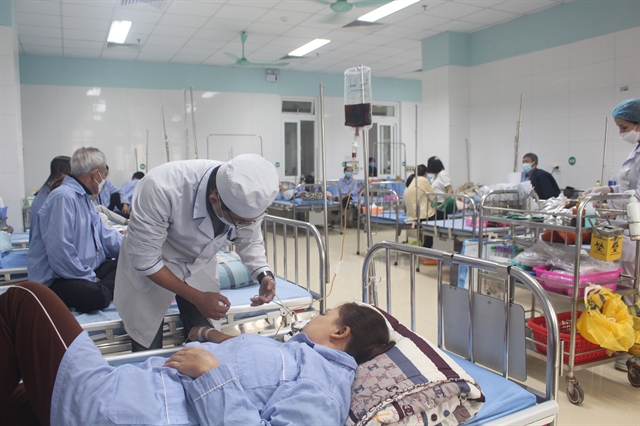 Society
Society

 |
| A doctor examines a thalassemia patient at Thanh Hóa Provincial General Hospital. — VNA/VNS Photo Hoa Mai |
THANH HÓA — Thanh Hóa Province is among the five localities with the highest number of people with thalassemia, a genetic disease that can cause severe fatigue as well as heart and liver problems if left untreated.
Approximately 450 patients regularly visit the Haematology and Blood Transfusion Centre of Thanh Hóa Provincial General Hospital for treatment of this illness.
Among them are siblings Bùi Hà Thu and Bùi Hà Anh, who were both diagnosed with thalassemia when they were only around seven months old.
Since then, they have been travelling to the centre for blood transfusions every month, with each treatment session lasting from seven to ten days.
Hà Thu said: “I remember the name of every doctor and nurse. They remember ours too, and always give us encouragement, so I really appreciate them.”
With both of their parents away for work to cover medical expenses, accompanying the siblings on these regular hospital visits in the past decade was their grandmother Bùi Thị Nhung.
She said: “During the long treatment sessions, each month we have to visit the hospital for blood transfusion and chelation therapy.
“We can feel the dedication and attentiveness of the doctors and nurses at the haematology and blood transfusion centre. The facilities here also provide thorough services for patients and their caregivers.”
Hà Thị Thảo, 38, has also been fighting thalassemia for the past 10 years.
“This illness causes me fatigue all the time and prevents me from working as an ordinary person.
“No one wants to call a hospital their ‘home,’ but that’s true for me and other thalassemia patients because, simply put, we spend as much time ‘living’ inside hospitals as we do in our houses,” said Thảo.
Thảo is also afraid of becoming a mother, as the child could inherit the disease from her genes.
With doctors’ encouragement, she continues her regular blood transfusion and chelation therapy sessions to maintain her health in the hope that one day medical breakthroughs would allow her to bear a healthy child.
Understanding the wishes of thalassemia patients like Thảo, Dr Nguyễn Huy Thạch, director of Thanh Hóa General Hospital’s Haematology and Blood Transfusion Centre, and his colleagues have been working on a provincial-level scientific study that looks into the characteristics of the faulty genes that cause the disease.
The research also aims to develop a premarital screening model to diagnose people with this type of gene.
Thạch encourages young couples to undergo premarital health check-ups. In cases where both the husband and wife carry the disease-causing genes, the couple should receive advice and diagnosis before having a child.
He said: “Our greatest wish is to raise awareness and provide consultation to people with faulty genes to reduce the number of children born with thalassemia.”
The disease often wears out patients financially, mentally and socially, as treatment sessions require extensive periods of time, which can cause disruptions in the case of child patients and increase the burden on the health care system.
To support the patients, Thanh Hóa General Hospital has been giving out 300 free meal vouchers every month for those in disadvantaged circumstances at the Haematology and Blood Transfusion Centre, a majority of them having thalassemia.
Since November 2022, the province has deployed a project to fight and prevent thalassemia with various activities carried out at the community level, including premarital health screening and examinations for parents who have a child with the disease, as well as for expecting mothers who carry the disease-causing genes. — VNS